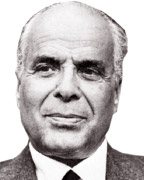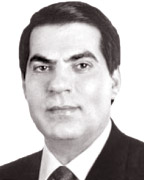|
International Relations and Security:
The Arab Spring and its consequences
Prof. Rajiva Wijesinha, MP
My worries about where America is leading us were increased by a
recent visit to Tunisia, which I found fascinating. I also found it
extremely sad, because tourism has suffered tremendously, since the Arab
Spring, which it will be remembered began in Tunisia just 2 ˝ years
back.
What happened in Tunisia seemed to me welcome, because the regime
there had undoubtedly been a dictatorship. Ben Ali, the President who
was finally got rid of after over 20 years, had in fact abolished the
Presidency for Life when he took over from Bourguiba, the hero of
independence. Bourguiba had become President for Life, and then got
increasingly incapable so he had to be deposed.
But though Ben Ali restored elections, he ensured that he was always
re-elected, and himself grew increasingly out of touch with reality.
And, unlike Bourguiba, who had affirmed valuable ideals at the time of
independence – including a determination to release women from the
restrictions traditions imposed on them, a litmus test I feel as to
whether a society is progressing – Ben Ali seems to have been interested
largely in benefits for himself and his family.
 |
 |
 |
| Barack
Obama |
Habib
Bourguiba |
Ben Ali |
This did not mean that Tunisia did not develop. It has an excellent
road system, and agricultural productivity is high, in the areas that
can be cultivated. It also developed a thriving tourist industry, given
the excellent amenities on its extensive coastline, and the fact that it
is a relatively small country with easy access to the main tourist
areas. Sadly, as is generally the case with the type of package tourists
such countries attract, there was not so much concern with the fantastic
range of historical buildings the country possesses, but these too were
readily accessible to keen visitors.
Political unrest
There are hardly any visitors at those sites now. We had the superbly
atmospheric ruins at Thuburbo Majus to ourselves while we were there,
and even in the more renowned Dougga there was just one group, of
Japanese. Only one other room was occupied, by Tunisians, at the
extraordinary underground hotel in Matmata, and the driver who took us
across the desert where boards advised care as to crossing camels said
that tourism had crashed after the revolution.
This surprised me, because I thought the revolution had had the
blessings of the West, and the regime that has emerged is in no way
extreme. But there is continuing political unrest, as I was told by our
ambassador in Lebanon, perhaps the most intellectually active member of
our Foreign Service today, whom I happened to meet at the airport on the
way out. The President had had to resign, I believe because of
fundamentalist pressures – and though these may not amount to much, the
way they are reported, as my interlocutors in Tunisia noted, leads to
diffidence about visiting on the part of many Westerners.
It may be unfair to blame the Americans for the wholesale destruction
of democracy in these countries, and I should note here that what
countries like ours do in response to American pressures is equally
destructive. We cannot pass on the responsibility for such reactions,
and must strive to ensure balance in what we do. But at the same time I
am astonished that the Americans have still not realized that the
consequences of their polarized and polarizing view of international
relations, Cleon rather than Diodotus in the dichotomy Thucydided
expounded over 2000 years ago when talking about the Athenian
destruction of Mytilene, is ultimately fatal to their own interests too.
Fifty years ago, when they first allowed the British to dragoon them
into destroying democracy in Iran, they helped the Shah to stifle all
outlets for dissent. So, when dissent broke out irrepressibly, as
dissent must when pressures are unbearable, the only institutions able
to provide backing were the religious ones. And, sadly, because the
Americans were unable to distinguish between religion and
fundamentalism, continuing opposition strengthened fundamentalism in
Iran – as the Americans have now realized, in regretting their failure
to accept the olive branches held out by President Khatami,
Ahmadenijad’s predecessor.
Second World War
Incidentally, that I think answers the point made by the German
ambassador, who noted the immense gratitude of his country and others to
the Americans, for their support in building up democracy in the
countries they had overcome in the Second World War.
The point is, in the forties, through the Marshall Plan and a
commitment to democracy, the Americans helped rebuild democratic
institutions in Germany and Japan. But somewhere in the fifties,
democracy became less important than capitalism (or rather adherence to
the West against the Soviets), so even the basic redistribution
post-colonial societies required was considered dangerous socialism, and
opposed vehemently – as happened with regard to India too.
Practical politics
Americans must realize that the dislike much of the Third World feels
for them (including those they pushed into power, such as the Taleban
many elements in the current Libyan government), as opposed to the
affection of the Germans and Japanese, suggests that something went
wrong when what they saw as practical politics trumped principles,
somewhere in the fifties. But the sausage machine has now taken over,
and despite all Obama’s intellectual capacity, I suspect he will not be
able to change things.
This is a pity, for what is happening in Tunisia suggests that,
unless confidence is restored and the economy begins to thrive, there
will be further unrest soon.
Two young men, in the course of otherwise open conversation, affirmed
the supremacy of their religion, which will inevitably be seen as the
only solution in a world in which other theories have no traction. And
in such cases it is the extremist and intolerant version of the religion
that is propagated, not the pluralistic approach that had flourished in
Tunisia. Its own religious traditions, as I found, are inclusive as
befits its history – but those are not what will hold sway if
resentments develop.
|





